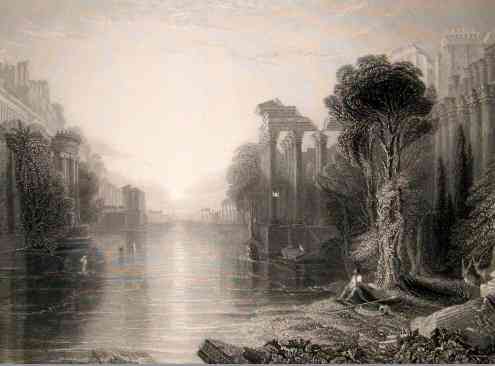Carthage
Thomas Kibble Hervey
After a Picture by Linton
IS it some vision of the elder day,
Won from the Dead-Sea waters, by a spell
Like hers who waked the prophet?—or a dream
Of burning Egypt,—ere the Libyan sand
Had flung its pall above its perished world,—
Dreamt on its dreary grave, that has no flowers?
It is the eastern orphan’s ocean-home!
The southern queen! the city of the sea,
Ere Venice was a name! the lofty heart
That battled for the empire of the world,
And all but won,—yet perished in the strife!
Now, in her young, proud beauty; the blue waves,
Like vassals, bending low to kiss her feet,
Or dancing to their own sweet minstrelsy!
The olives hanging round her crested front,
Like laurel-crowns upon a victor’s brow!
Beneath her palms, and mid her climbing bowers,
Darts, like a sunny flash, the antelope!
And bound the wild deer, where the severing boughs
Wave forth a goddess! in her hunter-guise,
She wakes the perfumes of the Tyrian’s groves,
To welcome from the waves her pilgrim boy,
And point his tangled pathway, to the towers
That to his homeless spirit speak of home!
Alas! the stately city! it is here,
Here, mid this palace pomp and leafy store,
(Bright as some landscape which the poet sees
Painted, by sunset, on a summer sky,
In hues the dolphin borrows when he dies!)
Mid all this clustering loveliness and life,
Where treads the Trojan,—that, in after years,
A lonelier exile and a loftier chief
Sat amid ruins!
The ancient Phoenician city of Carthage lies in ruins near Tunis, the capital of the modern-day state of Tunisia.
The story of Carthage's wars with the Roman Empire, its defeat and ruin have inspired many poems about the city.
Main Location:
Carthage Ancient Ruins, La Goulette Road, 7016, Tunisia

Romantic vision of the Ruins of Carthage in Tunisia; print after painting by Linton